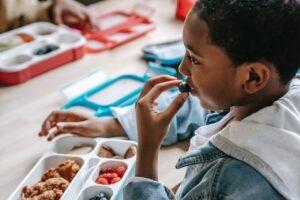 When the topic of healthy lunches comes to mind, we usually don’t think about what foods are healthy for our teeth. Children’s Dental Health Month provides the perfect avenue to go over what actions we can take to ensure we are looking after the oral health of our child(ren) so they can grow up having healthy eating habits.
When the topic of healthy lunches comes to mind, we usually don’t think about what foods are healthy for our teeth. Children’s Dental Health Month provides the perfect avenue to go over what actions we can take to ensure we are looking after the oral health of our child(ren) so they can grow up having healthy eating habits.
There are certain types of foods that are good for teeth and help safeguard the teeth from cavities.
Table of Contents
Foods that are Healthy for Teeth:
Cheese.
For us Californians, we are glad to hear that cheese is actually beneficial for our teeth. Cheese increases the pH inside our mouths and reduces the likelihood of contracting tooth decay. It is believed that the chewing involved during eating cheese intensifies saliva production inside the mouth. Cheese also comprises protein and calcium, nutrients that help in nourishing the enamel. With this in mind, cheese makes for a tasty snack and an excellent way to finish meals since it can safeguard your teeth until you brush them when going to sleep.
Yogurt.
Similar to cheese, yogurt is abundant in protein and calcium, meaning it will assist in strengthening and improving general oral health. The probiotics in the yogurt are also good bacteria that help your gums. This happens since the good bacteria push out the bacteria that cause cavities. If you decide to choose yogurt over other snacks, go for a healthy yogurt brand that is plain and doesn’t contain artificial or added sugars.
Leafy Greens.
Unsurprisingly, leafy greens usually find their way into every type of healthy food inventory. They are rich in minerals and vitamins while calories are extremely low. Spinach and kale also help with good oral health. They are abundant in calcium, which assists in bolstering the enamel.
If you are having a hard time incorporating leafy greens into the diet, try adding one or two baby spinach leaflets to your salad or trickle some kale on top of pizza. You can mix some greens in a smoothie with other fruits.
Apples.
The ADA advises that one should keep away from sugars; however, there are some provisions to this. In this instance, natural fruits such as apples may have natural sugars inside them, but they also comprise fiber and water. The apple’s fibrous texture triggers the gum tissue, which assists in safeguarding the mouth. Consuming apples also elicits the production of saliva, which naturally washes away bacteria and food bacteria. Apples can’t substitute the purpose of brushing your teeth, but they will act as a bandage until you reach home or have to brush next. You should think about eating apples after a meal to help with cleaning your mouth.
Carrots.
As with apples, carrots are tasty, crunchy, and rich in fiber, which assists in the generation of saliva and subsequently washes away bacteria and reduces the risk of developing cavities. You can introduce carrots to your kids as a tasty snack that can either be eaten raw or with dip.
Celery.
Celery is usually seen to be watery, and bland, and is even criticized for its fibrous strings. However, it’s features like these that make celery healthy for teeth. As with carrots and apples, celery washes away bacteria, decreasing the risk of decay and cavities.
Almonds.
Almonds are beneficial to your teeth as they are an excellent source of protein and calcium while having low sugar levels. If you put just a quarter cup in your kid’s lunch, the almonds can really help in inhibiting cavities and strengthening teeth. If you don’t prefer almonds alone, you can add a salad or insert them in a stir-fry.
It goes without saying that foodstuffs that are beneficial for your teeth are also good for your general health and well-being. These foods are ideal snacks and can easily be included in your child’s school lunch.
Additionally, the ADA catalogs nine types of foods that are likely to damage or harm your teeth. Keeping these types of foods away from school lunches can help encourage oral health. Here are four drinks and foods to take caution of when preparing your child’s lunch.
Foods that are Harmful to Teeth:
Hard Candies.
Hard candies may come off as risk-free, but they quickly leave your teeth susceptible to a lot of sugars and can even cause dental emergencies. Chewing and crushing hard candies can destroy existing dental work or crack or chip a healthy tooth. You can substitute this habit by chewing sugar-free gum, a perfect alternative to hard candies.
Foods High in Acidity.
Constricting your citric acid consumption in fruits such as lemons, oranges or even juice can assist in safeguarding your teeth. Acidic food products can eat away at the enamel as time lapses, leaving them susceptible to cavities. These foods also worsen mouth sores. Alternatively, go for fruits such as apples, which encourage healthy mouths.
Be Cautious of Crunchy Foods.
Who doesn’t enjoy eating a bag of Doritos or Potato chips? While these foodstuffs are tasty, they aren’t ideal for your oral health. Potato chips contain starches that get lodged on teeth and cause cavities and tooth decay. If you can’t help but eat your beloved chips, ensure that you brush after in order to get rid of harmful starches and inhibit them from causing cavities.
Skip Juices, Sodas, and Sports Drinks.
Although they are sweet on the tooth, these drinks are filled with sugars. Carbonated drinks are also dangerous for your teeth due to their acidity, which suggests that it corrodes your enamel. The best drink to frequently intake is water as it assists in washing away bacteria while being calorie- and sugar-free.
You can play your part in improving the oral health of your child by preparing mouth-healthy foods for their lunch. However, you should keep in mind that none of these foodstuffs will substitute flossing, brushing, or visiting your dentist for regular cleanings. Ensure that your child(ren) brushes their teeth twice per day for no less than two minutes and make an appointment with a dentist every six months.
Some of the mentioned foodstuffs may not be ideal if your child(ren) is presently getting orthodontic treatment since they can be detrimental to braces and result in broken dental appliances or brackets. Consult with your child’s orthodontist to identify mouth-healthy alternatives.
Arrange a consultation with our J Street Dental Group dental office. Our specialists will help you make informed, manageable, and healthy oral options.
